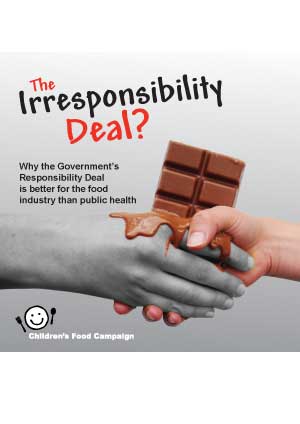
The Irresponsibility Deal? Why the Government's Responsibility Deal is better for the food industry
32pp - 2011 | 3682Kb

The Irresponsibility Deal? Why the Government's Responsibility Deal is better for the food industry
32pp - 2011 | 3682Kb
This report analyses the Coalition Government’s Public Health Responsibility Deal, focusing on the pledges made by members of the food industry. The Government’s stated aim, for this Deal, is to help reduce the serious health problems caused by our unhealthy diets.
We agree that the need for effective public health policies has never been stronger, but this report shows that, in our view, the Responsibility Deal is not up to the task. The analyses conducted by Children’s Food Campaign demonstrates what each “partner” had committed to, but also for the first time, what they had decided not to commit to, and in some cases what they had irrelevantly committed to.
1. Introduction: the crisis in our nation’s dietary health
2. Responsibility Deal: corporate takeover of public health policy?
3. Food Network pledges
4. Who signed up to what - a new perspective
5. Results
6. Our verdict
7. Conclusion and recommendations
Appendix A – table of results
References
Children's Food Campaign: Better food and food teaching for children in schools, and protection of children from junk food marketing are the aims of Sustain's high-profile Children's Food Campaign. We also want clear food labelling that can be understood by everyone, including children.
Sustain
The Green House
244-254 Cambridge Heath Road
London E2 9DA
020 3559 6777
sustain@sustainweb.org
Sustain advocates food and agriculture policies and practices that enhance the health and welfare of people and animals, improve the working and living environment, promote equity and enrich society and culture.
© Sustain 2024
Registered charity (no. 1018643)
Data privacy & cookies
Icons by Icons8